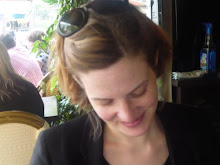
 At Equator Books, a Venice bookstore that offers old editions and out-of-print books, vinyl albums and photography exhibitions (above, a dog shot by Martin Cohen), I was stunned and delighted to find a first American edition of Sylvia Plath's only novel, The Bell Jar. How could I resist?
At Equator Books, a Venice bookstore that offers old editions and out-of-print books, vinyl albums and photography exhibitions (above, a dog shot by Martin Cohen), I was stunned and delighted to find a first American edition of Sylvia Plath's only novel, The Bell Jar. How could I resist?Plath indeed is an author I adore. I think she is generally very much underestimated as a poet because she was so beautiful, because her life was so very dramatic, ending in a suicide in the dark cold of a London winter, and because of the cult teen following that attached to her after she died. All this, I suspect, made academics weary of her work, yet it is truly exceptional.
This edition of The Bell Jar reveals yet another aspect of her extraordinary talent - in the field of art, as the book features Plath's very own illustrations. Sylvia, endlessly gifted.
I love her.

 Speaking of illustration...History fans, art fans, illustration fans, Maira Kalman fans, do not miss, and I mean do not miss Kalman's superb, quirky and funny In Love With A. Lincoln, a tribute to the great president, in The New York Times!
Speaking of illustration...History fans, art fans, illustration fans, Maira Kalman fans, do not miss, and I mean do not miss Kalman's superb, quirky and funny In Love With A. Lincoln, a tribute to the great president, in The New York Times!And speaking of books, check out this fabulous round couch with surrounding bookshelves designed by Irina Zhdanova. I want it!!






































































 Emily Dickinson
Emily Dickinson




 Take the Quiz here!
Take the Quiz here!